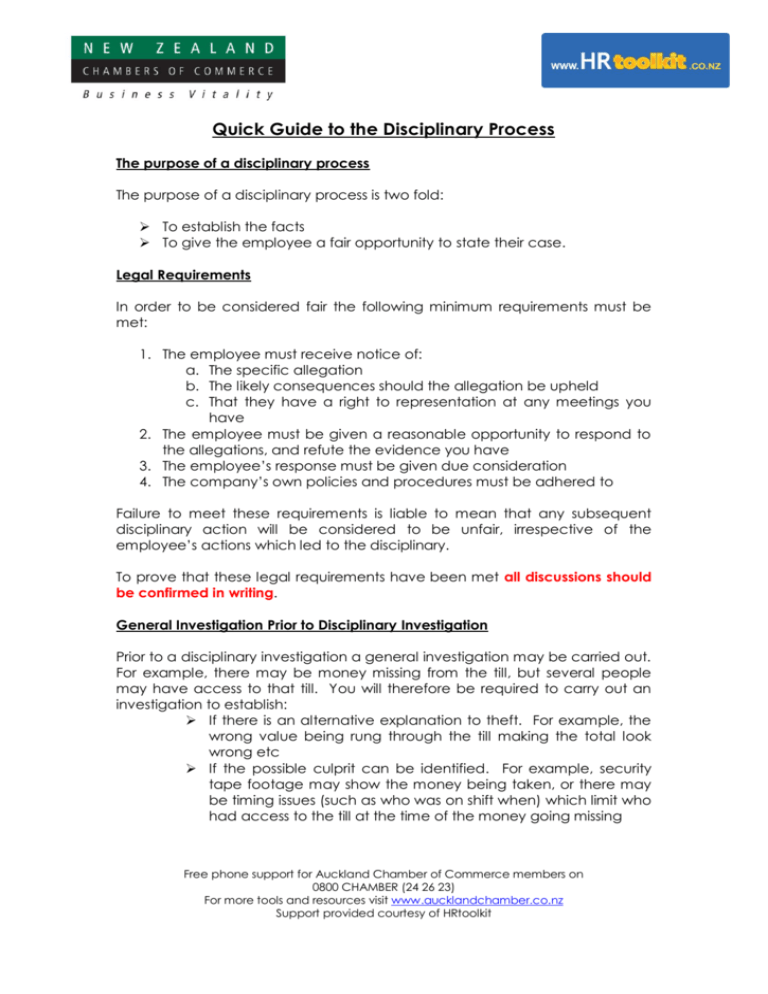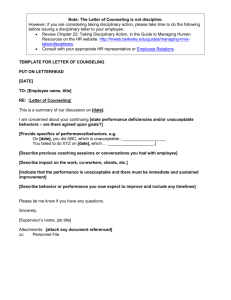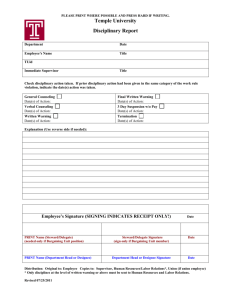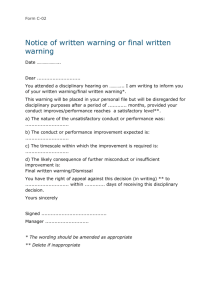Quick Guide to Disciplinary Process
advertisement

Quick Guide to the Disciplinary Process The purpose of a disciplinary process The purpose of a disciplinary process is two fold: To establish the facts To give the employee a fair opportunity to state their case. Legal Requirements In order to be considered fair the following minimum requirements must be met: 1. The employee must receive notice of: a. The specific allegation b. The likely consequences should the allegation be upheld c. That they have a right to representation at any meetings you have 2. The employee must be given a reasonable opportunity to respond to the allegations, and refute the evidence you have 3. The employee’s response must be given due consideration 4. The company’s own policies and procedures must be adhered to Failure to meet these requirements is liable to mean that any subsequent disciplinary action will be considered to be unfair, irrespective of the employee’s actions which led to the disciplinary. To prove that these legal requirements have been met all discussions should be confirmed in writing. General Investigation Prior to Disciplinary Investigation Prior to a disciplinary investigation a general investigation may be carried out. For example, there may be money missing from the till, but several people may have access to that till. You will therefore be required to carry out an investigation to establish: If there is an alternative explanation to theft. For example, the wrong value being rung through the till making the total look wrong etc If the possible culprit can be identified. For example, security tape footage may show the money being taken, or there may be timing issues (such as who was on shift when) which limit who had access to the till at the time of the money going missing Free phone support for Auckland Chamber of Commerce members on 0800 CHAMBER (24 26 23) For more tools and resources visit www.aucklandchamber.co.nz Support provided courtesy of HRtoolkit A good guide is that AS SOON as you can reasonably name a suspected person and an act, you should cease the general investigation and start disciplinary investigation. Why is it important to tell people we are doing an investigation on them? We all have the basic right to understand the potential consequences before answering a question, i.e. it would be unfair to ask a person ‘did they do X’, without them understanding that, if they answer ‘Yes’ it could impact on their employment. Notifying an Employee of a Disciplinary Investigation It is strongly recommended that notification of a disciplinary meeting be: (a) Presented in writing (b) Given to the employee at least 24 hours prior to the disciplinary meeting (c) Be given to the employee in person, and they be talked through the contents of the letter Does a Disciplinary Investigation mean that disciplinary action will be taken? NO. The purpose of the investigation is to find out the facts. If the facts are that no wrong doing has occurred, then there will be no disciplinary action. The right to Representation Employees have the legal right to bring a representative/support person of their choice to a disciplinary meeting. It is also recommended that an employer also has a representative with them at any disciplinary meeting. Employees may bring a friend, co-worker or even a lawyer, it is their choice, and they may even bring more than one representative/Support Person if they choose. However, the purpose of a representative/support person is to support an employee, it is not to speak fully on the employees behalf. If you want the employee to answer a question directly then you can request that they do so, and you can take it into account if they refuse to answer you directly. This may become an issue if you have reason to suspect the employee is lying, or you are asking them to describe exactly what happened in a specific situation at which the representative/support person was not present. NB. Though there is no hard and fast definition, a Lawyer or Union delegate would generally be referred to as a Representative because they are usually there to represent the employee, and possibly even negotiate on the Free phone support for Auckland Chamber of Commerce members on 0800 CHAMBER (24 26 23) For more tools and resources visit www.aucklandchamber.co.nz Support provided courtesy of HRtoolkit employees behalf. A family member or friend would generally be referred to as a Support Person as they are generally there to provide moral support. How detailed does the investigation have to be? The requirements of employment law are not as stringent as criminal law. You therefore do not have to prove ’beyond reasonable doubt’, however, you do have to act ‘reasonably’. Unfortunately reasonableness is not defined, and, if you are unfortunate enough to end up in employment court, it can come down to the judge’s opinion versus your opinion. One way to think about this is the decision that a reasonable employer would make given the facts of the situation. Sometimes it helps to take the emotion out and consider what another employer would do in the same situation. The Disciplinary Due Consideration Assessment worksheet can be a useful tool for you to assess whether you have been sufficiently thorough in your investigation, or whether there are further questions that you need to ask. Interviewing other people as part of an investigation It is sometimes necessary to interview other people as part of an investigation, e.g. witnesses to what happened etc. However, you still need to protect the privacy of the person you are investigating. You should therefore: Speak only to those people it is necessary to speak to Advise the employee in advance who you will be speaking to Stress with those people that you are speaking to that this is an investigation, and that they should keep any information they get as confidential What do you do with information you find during the investigation? As part of the investigation you may find new evidence. You need to: Provide this new evidence to the employee Give the employee time to consider the new evidence. Depending on the nature of the new evidence they could reasonably ask to consider the evidence overnight. It is recommended that you confirm in writing that you have provided new evidence, particularly if this is likely to have a significant impact on the decision you make, or if the offence is serious and you are therefore considering dismissal. Remember, the purpose of the disciplinary process is to find out the truth NOT to try and trip people up by ‘springing’ new evidence on them. Free phone support for Auckland Chamber of Commerce members on 0800 CHAMBER (24 26 23) For more tools and resources visit www.aucklandchamber.co.nz Support provided courtesy of HRtoolkit Making the final decision and presenting it Once you have completed the investigation decide on the appropriate outcome (use the Disciplinary Due Consideration Assessment as necessary). You then need to tell the employee your decision and confirm this in writing. Warnings do not last forever, a recommended ‘lifespan’ for warnings is: First Written Warnings – 6 months Second Written Warning – 12 months Final Written Warnings – 18 Months Do all three levels of warning have to be given? NO. For minor issues such as performance issues, lateness etc, you would anticipate that 3 warnings would generally be given prior to dismissal. However, for more serious offences, you may go straight to a 2 nd, or Final Warning, or even Dismissal (for very serious offences such as theft) without any prior warnings having been given. The rule of thumb is ‘what would the employee have anticipated to be the outcome of their actions?’ For example, an employee who is repeatedly 10 minutes late for work would probably anticipate a First Written Warning, and employee who failed to turn up for work at all for a couple of days may anticipate a Second Written Warning, and employee who stole money from the till would probably anticipate getting dismissed. What happens if I get it wrong? Whenever you take action against an employee they have a legal right to raise a personal grievance. The risk of this happening can never be totally eliminated, however it can be significantly reduced by: Following a fair and open process Treating the employee fairly A good test is to see if you are being ‘fair’ is to put yourself in the employee’s shoes and imagine how you would feel in their situation. If the employee does raise a grievance then it is strongly recommended that you immediately seek professional advice in order to resolve the situation as quickly as possible. Irrespective of whether you have done everything absolutely correctly, the legal costs associated with defending a grievance through the process can very quickly escalate out of all proportion to any loss of pride from admitting an error! Free phone support for Auckland Chamber of Commerce members on 0800 CHAMBER (24 26 23) For more tools and resources visit www.aucklandchamber.co.nz Support provided courtesy of HRtoolkit In the event that you do get a personal grievance, you can anticipate the following sequence of events: You need to respond to the grievance in writing It this does not resolve the issue, you or the employee can request mediation from the Department of Labour’s Mediation Services If mediation does not resolve the issue, the Employment Relations Authority can undertake an investigation and make a determination If either party does not agree with the determination from the Employment Relations Authority, then you will need to go to Employment Court for a full judicial hearing. Please note that a disciplinary action based on an unfair process will be considered unfair, irrespective of what an employee has or has not done. However, the good news is that an employee’s contribution to the outcome is taken into account when considering the compensation an employee will be awarded. They therefore may win, but be awarded no compensation. Unfortunately the legal costs of defending such legal action will be very expensive, and it is unlikely that you will be able to claim some, if any of this money back, even if you as the employer win. This is all too hard, why do anything at all? Failure to take action against an employee who should be disciplined will result in: Stress for you as an employer, worrying about it Resentment and potentially poor performance from other staff who see someone ‘getting away’ with things Loss of respect in you as employer for failure to action! In virtually every business the highest single business cost centre is Payroll. If you are not spending that payroll wisely, this can very quickly impact particularly for small business. Associated Documentation 1. 2. 3. 4. 5. 6. 7. Performance Improvement Plan Template Disciplinary Due Consideration Assessment Invitation to Disciplinary meeting letter First or Second Written Warning letter Final Written Warning letter Termination with notice letter Summary Dismissal Letter Free phone support for Auckland Chamber of Commerce members on 0800 CHAMBER (24 26 23) For more tools and resources visit www.aucklandchamber.co.nz Support provided courtesy of HRtoolkit Document Reference for document updates and version control Document Title: Quick Guide to the Disciplinary Process Reference: Discip 02 Nov 08 Free phone support for Auckland Chamber of Commerce members on 0800 CHAMBER (24 26 23) For more tools and resources visit www.aucklandchamber.co.nz Support provided courtesy of HRtoolkit








